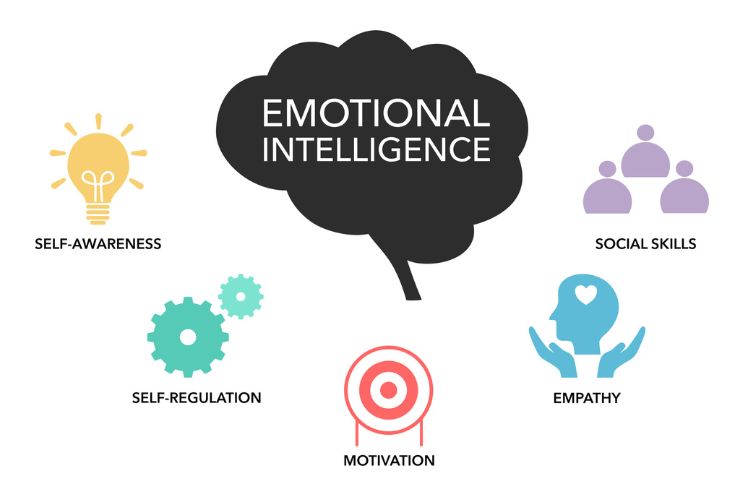Improving our emotional intelligence (EI) can greatly enhance our personal and professional lives. By focusing on our self-awareness and managing our mood, we can build stronger relationships and navigate challenges more effectively. Emotional intelligence helps us understand our feelings and those of others, which is crucial for effective communication and collaboration.

In this blog post, we will explore five simple ways to boost our emotional intelligence. These strategies will help us develop essential skills like self-regulation and empathy, making it easier to handle stress and connect with others. Whether we aim to improve our own mindset or foster better connections in our team, these tips will serve as valuable tools for growth.
Let us dive into these straightforward techniques that can lead us to greater emotional awareness and resilience. By embracing these practices, we can enhance our overall well-being and contribute positively to our interactions and environment.
Understanding Emotional Intelligence

Emotional intelligence (EI) involves recognising and managing our own emotions as well as understanding the emotions of others. We can enhance our emotional intelligence by focusing on specific components like self-awareness and self-regulation. These aspects contribute significantly to our overall emotional skills.
Components of EI: Self-Awareness and Self-Regulation
Self-awareness is the first step in improving our emotional intelligence. It allows us to identify our emotions and understand how they affect our thoughts and actions. This understanding helps us respond more appropriately in social situations.
Self-regulation is our ability to control our emotional responses. When we practise self-regulation, we can prevent impulsive reactions and manage our behaviour effectively. Techniques like deep breathing, pausing before responding, and reflecting on our emotions help strengthen this skill.
Improving Mood Through Emotional Awareness
Emotional awareness plays a key role in enhancing our mood. By acknowledging our feelings, we can influence how we respond to daily challenges. Recognising when we are stressed or upset allows us to take proactive steps to improve our situation.
For example, we might choose to engage in activities that boost our mood, such as exercise, mindfulness, or talking with friends. This awareness not only helps us manage our emotions but also increases our resilience in stressful situations. Building emotional awareness ultimately leads to better interactions with others and a more fulfilling life.
Developing Empathy and Interpersonal Skills

Improving our emotional intelligence starts with developing empathy and interpersonal skills. These abilities help us connect better with others and enhance our professional success. We can achieve this through understanding, communication techniques, and active listening.
Cultivating Empathy for Professional Success
To cultivate empathy, we should practice putting ourselves in others' shoes. This means trying to understand their feelings and perspectives. We can start by observing non-verbal cues, like body language and facial expressions.
Reflecting on our experiences can also help. When we encounter similar situations, we gain insights into how others might feel. By engaging in conversations about feelings, we can deepen our emotional connections. This practice not only enhances teamwork but also creates a supportive workplace.
Techniques for Assertive Communication
Assertive communication is about expressing our thoughts and feelings clearly and confidently. We should use "I" statements to communicate our feelings without blaming others. For example, saying "I feel stressed when deadlines are not met" is clearer than saying "You always miss deadlines."
We can also maintain eye contact and use a calm tone of voice. This shows that we are sincere and engaged. Additionally, being mindful of our body language reinforces our message. By practising assertive communication, we enhance our interactions and build trust within our teams.
Enhancing Relationships with Active Listening
Active listening is crucial for improving our relationships. It involves fully concentrating on what others are saying, rather than just waiting for our turn to speak. We can show that we are listening by nodding and giving verbal acknowledgements, like "I see" or "That makes sense."
It's important to summarise what we've heard to confirm our understanding. For instance, saying "So what you’re saying is..." helps clarify any misunderstandings. This fosters an environment where people feel valued and understood. By making active listening a habit, we strengthen our connections and improve our emotional intelligence.
Self-Management Strategies

In order to improve our emotional intelligence, we can use specific self-management strategies. These techniques help us regulate our emotions and react thoughtfully in different situations. Two effective methods are mindfulness with deep breathing and journaling to better understand our emotional reactions.
The Power of Mindfulness and Deep Breathing
Mindfulness teaches us to stay present in the moment. It helps us observe our thoughts and feelings without judgment. This practice allows us to reduce stress and improve self-awareness.
Deep breathing is a key part of mindfulness. When we feel overwhelmed, taking slow, deep breaths can help calm our mind and body. We might try this simple technique:
- Inhale deeply through the nose for a count of four.
- Hold the breath for a count of four.
- Exhale slowly through the mouth for a count of four.
- Repeat this cycle a few times.
By incorporating mindfulness and deep breathing into our daily routine, we can enhance our emotional self-control and respond better to stress and challenges.
Using Journaling to Understand Emotional Reactions
Journaling is an excellent way to explore our emotions. By writing down our thoughts and feelings, we gain insight into our emotional reactions. This practice can help us identify triggers that affect our mood and behaviour.
When we journal, we can ask ourselves questions like:
- What emotions did I feel today?
- What situations triggered these emotions?
- How did I react, and how could I react differently next time?
Regular journaling allows us to track patterns in our emotional responses. Over time, this method improves our emotional intelligence and promotes better self-management. The more we understand our emotions, the more control we have over them.
Building Emotional Resilience

To build emotional resilience, we need to focus on effective rest and emotional regulation. Both are crucial for maintaining our mental health and preventing burnout. Here are some strategies to enhance our capacity to cope with stress and challenges.
Preventing Burnout with Effective Rest
Effective rest is essential for preventing burnout. When we are constantly busy, our bodies and minds don't get the break they need.
To enhance rest, we can:
- Set Boundaries: Limit work hours and stick to them.
- Take Breaks: Short breaks during tasks can recharge us.
- Prioritise Sleep: Aim for 7-9 hours of quality sleep each night.
Incorporating restorative activities, such as hobbies or passive relaxation, into our routine helps us recharge. Practices like mindfulness meditation can also ground us and lower stress levels. By ensuring we rest well, we can boost our emotional intelligence and handle challenges better.
Maintaining Mental Health Through Emotional Regulation
Emotional regulation involves managing our emotional states. This skill allows us to respond to situations calmly instead of reacting impulsively.
To improve emotional regulation, we can:
- Practice Self-Reflection: Journaling our thoughts helps clarify our feelings.
- Use Breathing Techniques: Deep breathing can calm our minds during stressful moments.
- Identify Triggers: Knowing what causes strong emotions helps us prepare and respond more effectively.
By focusing on our emotions and understanding them, we build resilience. This self-awareness enhances our emotional intelligence and supports our mental health, allowing us to navigate challenges with more confidence.
Fostering Continuous Growth
To enhance our emotional intelligence (EI), we must focus on continuous growth. Two key elements in this journey are cultivating curiosity and integrating EI with intellectual intelligence (IQ). Both play crucial roles in our development as effective leaders and socially aware individuals.
The Role of Curiosity in Enhancing EI
Curiosity drives us to explore our emotions and the emotions of others. It encourages self-awareness, helping us recognise our feelings and responses. When we ask questions and seek to understand our emotional triggers, we can manage our reactions better.
By being curious, we also learn about others. This understanding promotes empathy, a core aspect of EI. Engaging in conversations and asking for feedback can deepen our insights. We can ask ourselves questions such as:
- What motivates others?
- How can I improve my responses?
Curiosity opens doors to new perspectives. As we learn from diverse experiences, we can better connect with colleagues, friends, and family.
Integrating EI and IQ for Holistic Development
Combining emotional intelligence with intellectual intelligence (IQ) offers us a well-rounded approach to personal growth. While IQ measures our analytical skills, EI helps us navigate social situations effectively.
Leaders with high EI can inspire and motivate teams. They notice emotional cues and respond appropriately, fostering a positive work environment. By enhancing our emotional awareness, we improve our decision-making abilities.
We should focus on activities that strengthen both EI and IQ. For instance:
- Participate in group discussions to refine social skills.
- Engage in problem-solving tasks to boost cognitive abilities.
By harmonising EI and IQ, we can develop a more profound understanding of ourselves and those around us. This balance allows us to thrive in both personal and professional settings.





















